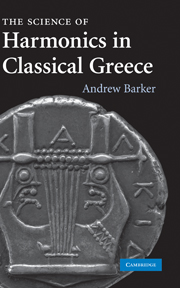Book contents
- Frontmatter
- Contents
- List of figures
- Preface
- Part I PRELIMINARIES
- Part II EMPIRICAL HARMONICS
- Chapter 2 Empirical harmonics before Aristoxenus
- Chapter 3 The early empiricists in their cultural and intellectual contexts
- Chapter 4 Interlude on Aristotle's account of a science and its methods
- Chapter 5 Aristoxenus: the composition of the Elementa harmonica
- Chapter 6 Aristoxenus: concepts and methods in Elementa harmonica Book i
- Chapter 7 Elementa harmonica Books II–III: the science reconsidered
- Chapter 8 Elementa harmonica Book iii and its missing sequel
- Chapter 9 Contexts and purposes of Aristoxenus' harmonics
- Part III MATHEMATICAL HARMONICS
- Postscript: the later centuries
- Bibliography
- Index of proper names
- General index
Chapter 3 - The early empiricists in their cultural and intellectual contexts
Published online by Cambridge University Press: 22 September 2009
- Frontmatter
- Contents
- List of figures
- Preface
- Part I PRELIMINARIES
- Part II EMPIRICAL HARMONICS
- Chapter 2 Empirical harmonics before Aristoxenus
- Chapter 3 The early empiricists in their cultural and intellectual contexts
- Chapter 4 Interlude on Aristotle's account of a science and its methods
- Chapter 5 Aristoxenus: the composition of the Elementa harmonica
- Chapter 6 Aristoxenus: concepts and methods in Elementa harmonica Book i
- Chapter 7 Elementa harmonica Books II–III: the science reconsidered
- Chapter 8 Elementa harmonica Book iii and its missing sequel
- Chapter 9 Contexts and purposes of Aristoxenus' harmonics
- Part III MATHEMATICAL HARMONICS
- Postscript: the later centuries
- Bibliography
- Index of proper names
- General index
Summary
Before the foundation of the great philosophical ‘schools’ in the fourth and third centuries, there were no institutions dedicated to scientific or other intellectual pursuits. Some thinkers recorded their ideas in writing, and these writings could travel widely, reaching other individuals at a long distance from their starting point. But no formally constituted community of scholars existed to provide a ready-made audience for the products of ‘academic’ endeavour. Who, then, were these pioneering harmonic scientists, and to whom did they address their work? Did they and their audiences fall into any clearly identifiable group or category, and if so, how were they related to other kinds of technical or intellectual specialist? Are they to be regarded as ‘intellectuals’ at all, comparable, for instance, to mathematicians, philosophers and astronomers? In what settings and for what purposes did they present their ideas? In this chapter I shall suggest two kinds of answer to these questions. They are different but perfectly compatible with one another; some at least of these theorists may very well have marched under both banners at once.
HARMONIC THEORISTS IN THE WORLD OF THE SOPHISTS
There is a small pointer towards my first suggestion in a passage of Aristoxenus which we glanced at in Chapter 2, where he speculates that those harmonikoi who set out their results in a notation did so in order to impress ‘lay persons’, people who were in no sense specialists in the musical sciences, and to give them something on which they could pass judgement (El. harm. 40.29–41.6).
- Type
- Chapter
- Information
- The Science of Harmonics in Classical Greece , pp. 68 - 104Publisher: Cambridge University PressPrint publication year: 2007



